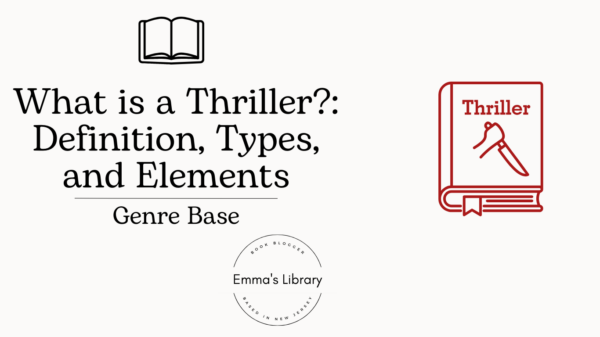
The vast landscape of literary genres offers something for every reader, from quiet romances to intense dramas. Yet, among these genres, one consistently captivates audiences with its blend of suspense, tension, and anticipation: the thriller. Defined by its ability to keep readers on the edge of their seats, a thriller novel is a masterclass in storytelling, ensuring that readers are hooked from the first page to the last.
Historical Evolution of Thriller Novels
The roots of thrillers can be traced back to early literature, where elements of suspense and mystery were already capturing imaginations. From gothic tales of the 18th century to the espionage narratives of the Cold War era, thrillers have continually transformed to reflect societal fears and fascinations. Works like John Buchan’s “The Thirty-Nine Steps” or Daphne du Maurier’s “Rebecca” laid the groundwork for the multifaceted thriller genre we recognize today.
Key Elements of a Thriller
While the settings and characters may vary, certain elements remain fundamental to the genre:
- Central Conflict: At the heart of every thriller is a central conflict, often pitting an underdog against seemingly insurmountable odds.
- Protagonists and Antagonists: Characters are clearly defined, with protagonists facing off against formidable antagonists, who often represent broader societal issues.
- Pacing and Tension: A hallmark of thrillers is the relentless pace, interspersed with moments of heightened tension, leading to a climactic showdown.
Types of Thriller Sub-Genres
The broader thriller genre branches into various sub-genres, each offering a unique spin:
- Psychological Thrillers: These delve deep into the human psyche, often blurring the lines between reality and imagination. Examples include “Gone Girl” by Gillian Flynn.
- Techno-thrillers: A blend of technological marvels and suspense, as seen in works like Michael Crichton’s “Jurassic Park”.
- Espionage Thrillers: Centered on spies, international intrigue, and political conspiracies, like John le Carré’s “Tinker, Tailor, Soldier, Spy”.
- Techno-thrillers: Focusing on technological advancements, these books often revolve around emerging technologies and their potential impact on society. Works like “Digital Fortress” by Dan Brown and “The Hunt for Red October” by Tom Clancy fit this category.
- Espionage Thrillers: Set against a backdrop of international intrigue and covert operations, espionage thrillers often deal with the world of spies, counterintelligence, and political tension. Think of novels like “The Bourne Identity” by Robert Ludlum or “The Spy Who Came in from the Cold” by John le Carré.
- Legal Thrillers: These thrillers are set within the context of the legal system. Lawyers, judges, and murky moralities often play central roles. John Grisham is a master of this sub-genre with novels like “The Firm” and “A Time to Kill.”
- Medical Thrillers: With plots revolving around medical phenomena, diseases, or bio-hazards, they blend science and suspense. Robin Cook’s “Coma” and Michael Palmer’s “Extreme Measures” are prime examples.
- Supernatural Thrillers: These blend elements of suspense with the paranormal. They might involve ghosts, unexplained phenomena, or otherworldly forces. Books like “The Da Vinci Code” by Dan Brown and “Heart-Shaped Box” by Joe Hill exemplify this category.
- Military Thrillers: Set against the backdrop of warfare or military institutions, these thrillers involve high-stakes operations, often spanning countries and continents. “Red Storm Rising” by Tom Clancy is a standout in this category.
- Domestic Thrillers: Focusing on suspense set in everyday environments, often revolving around familial and relationship dynamics. “The Girl on the Train” by Paula Hawkins and “Big Little Lies” by Liane Moriarty are shining examples.
- Heist Thrillers: Centered around the planning and execution of a major theft or crime, emphasizing the psychological interplay between characters. “The Town” by Chuck Hogan and “Prince of Thieves” by Michael Crichton dive deep into this sub-genre.
- Historical Thrillers: Set in a particular historical period, these novels blend real historical events with suspenseful plots. “The Alienist” by Caleb Carr and “The Name of the Rose” by Umberto Eco are wonderful representations.
Why Thrillers Resonate with Readers
Thrillers have a universal appeal, primarily due to the emotional rollercoaster they provide. The cathartic experience of navigating a book’s twists and turns offers an adrenaline rush unlike any other. Moreover, thrillers often present moral dilemmas, pushing readers to question their own beliefs and ethics.
Popular Thriller Authors and Their Impact
The thriller genre has been shaped by numerous iconic authors. Stephen King, often dubbed the ‘Master of Horror,’ has penned numerous thrillers that transcend the boundary between horror and suspense. Agatha Christie’s whodunits, while rooted in mystery, often employ thrilling elements. Contemporary authors like Tom Clancy and John Grisham have further expanded the boundaries of the genre, introducing elements of political and legal intrigue. To learn more, check out our guide on The Best Thriller Books for Beginners.
Conclusion: The Everlasting Appeal of Thriller Books
Thrillers, with their potent blend of suspense, action, and emotional depth, have stood the test of time, continually evolving to mirror societal changes. As the world becomes increasingly complex, the genre’s ability to provide both escapism and reflection ensures its enduring popularity. As literary trends shift and morph, one thing remains certain: the allure of the thriller book is here to stay.